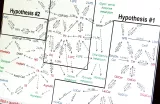Research, experimental development and innovation at the Faculty of Chemical Technology are focused on high-quality basic and applied research. The faculty’s priority is long-term implementation and targeted support for excellent research in the core chemical disciplines of analytical chemistry, inorganic chemistry, organic chemistry, physical chemistry, electrochemistry and other chemical disciplines. However, the scientific research activities of the faculty also extend significantly into field of material sciences.
International cooperation is an integral part of high-quality research. It is essential for establishment of viable creative teams and the faculty has long supported this in line with its vision. Within the faculty, the Centre of Materials and Nanotechnology (CEMNAT), which was established in 2013, has the largest international and scientific overlap. The activities of the centre are focused mainly on the field of material sciences (photonics, electronics, renewable energy sources and chemically active surfaces, etc.). In view of the centre’s focus, materials are also studied in nanoscale forms (nanoparticles, nanotubes, nanofibres and thin films). CEMNAT has state-of-the-art instrumentation and has been included in the Roadmap of Large Infrastructures for Research, Experimental Development and Innovation of the Czech Republic since 2016.
Testament to the quality of research at the faculty is the fact that it has been awarded an Advanced Grant by the European Research Council intended for excellent principal investigators from Europe and the rest of the world. This prestigious grant, which is considered a benchmark of research quality in Europe and a prestigious award for researchers, was awarded to prof. Holčapek. The research team led by prof. Holčapek was the first in the world to develop a method for early diagnosis of certain types of cancer.
The faculty maintains intensive international cooperation not only on the level of individual departments and research teams, but also in the field of doctoral degree programmes. As one example among many, we could mention the International Cooperative Graduate Program with the National Institute for Materials Science in the Japanese city of Tsukuba, where our doctoral students undertake one-year internships as part of their doctoral studies. This research institution is one of the most successful international material science institutions in the world.
From the point of view of long-term publication activities in internationally respected publishing media or outstanding results of applied research, involvement in national and international research projects and the creation of independent scientific schools in collaboration with doctoral students and younger colleagues, nine personalities can currently be identified at the faculty in the field of basic research and five personalities in the field of applied research who, together with their scientific research teams, represent the main development trends in the field of chemical and material sciences.
Basic research
prof. Ing. Roman Bulánek, Ph.D.
Physical Chemistry, Heterogeneous Catalysis, Adsorption and Surface Chemistry
prof. Ing. Filip Bureš, Ph.D.
Organic and Materials Chemistry
prof. Ing. Libor Dostál, Ph.D.
Inorganic chemistry
prof. Ing. Michal Holčapek, Ph.D.
Analytical Chemistry
Ing. Miloš Krbal, Ph.D.
Inorganic chemistry, Solid state chemistry
Dr.-Ing. Jan Macák
Materials Sciences, Electrochemistry
prof. Ing. Jiří Málek, DrSc.
Physical Chemistry, Material Research
prof. Ing. Petr Němec, Ph.D.
Chemistry and Physics of Inorganic
prof. Ing. Aleš Růžička, Ph.D.
General and Inorganic Chemistry
Applied research
doc. Ing. Robert Matyáš, Ph.D.
Explosives
prof. RNDr. Tomáš Roušar, Ph.D.
Cellular toxicology
doc. Ing. Tomáš Syrový, Ph.D.
Material Printing, Printed Electronics

